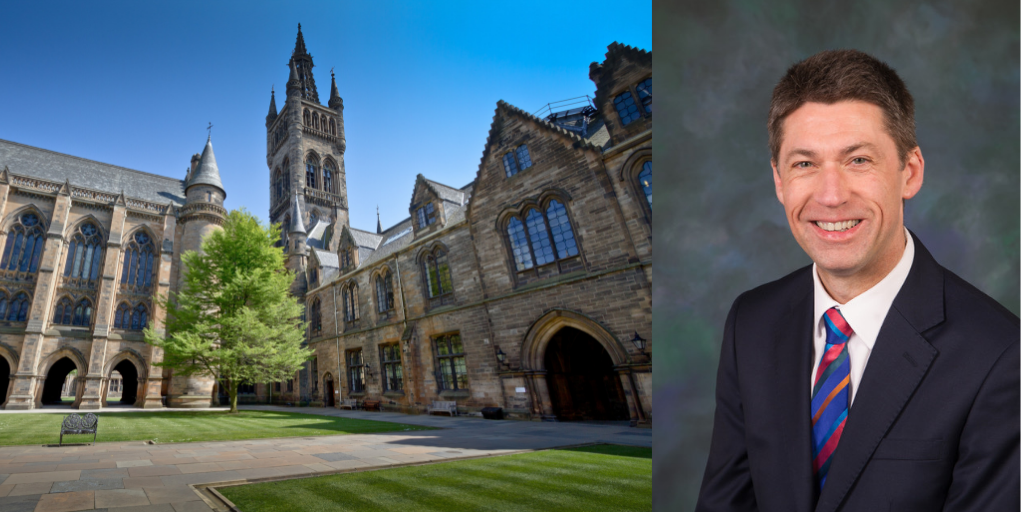Meet our Members: David Duncan
David Duncan, Chief Operating Officer and University Secretary at the University of Glasgow, discusses what his role encompasses as well as the challenges for his institution and the sector.

What is your higher education history?
I studied History at the University of Aberdeen, then took a Masters and a PhD in history at Queen’s University in Canada, where I was a Commonwealth Scholar. The thesis was on the workings of the South African state and the regulation of African labour before 1948 (published in 1995 and still available second hand on Amazon, if you are suffering from insomnia). I also did a postdoc – a Visiting Research Fellowship at the University of the Witwatersrand (Wits) where I worked on the South African motor industry.
I worked for a Scottish Non Departmental Public Body (a quango) for nine years and became a university secretary in 2001, first at Dundee, then York and most recently at Glasgow.
I have taught or tutored history students at Queen’s, Wits, Natal, St Andrews, Dundee and York. In 2019-20, I plan to do a little teaching at Glasgow.
What does your current role and remit encompass?
Glasgow is organised into four academic colleges plus the central University Services. I’m responsible for all the University Services except Finance.
We are organised into a series of directorates; my direct reports cover: Student & Academic Services; Human Resources; Information Services (Library & IT); Research & Innovation Services; Estates; Commercial Services; External Relations; Strategy & Planning; the Transformation team; the Hunterian Museum & Art Gallery.
As University Secretary, I am responsible for supporting the University Court (the governing body).
What does a typical day look like for you in your role?
My day is a fairly standard mixture of one-to-one meetings with people I line manage; committee and working group meetings; supporting the Principal and other academic leaders; supporting the Convener of Court (chair of the governing body); and the occasional bit of firefighting.
Increasingly, given the amount of press interest in the sector, there are conversations with our Director of Communications about how to handle news stories which have a bearing on the University’s reputation.
I usually end the day in the office dealing with correspondence and then read my papers for the next day when I get home. There are also receptions, dinners, lectures, exhibition openings, chapel services and so on in the evenings and sometimes at weekends.
Externally, I am deputy chair and a member of the AHUA Executive; treasurer and board member of the Environmental Association of Universities & Colleges; and an employer representative on New JNCHES (the national forum for pay negotiations).
What do you find most enjoyable and/or challenging in your role?
I love the mix of strategic and operational responsibilities. My favourite part is working with students – the SRC President and I co-chair our Student Experience Committee. I greatly value the close relationship with the Student Representative Council and the Sports Association President. Trying to keep ahead of constantly changing student demand and finding ways to enhance student life is an endless source of fascination. All in all, it’s a fantastic job.
What are the current challenges for your institution?
I have never known a time of greater uncertainty in the sector (OK, Glasgow went through a sticky patch during the 1745 Jacobite Rising, but I wasn’t in post then).
Financially, the sector in all parts of the UK faces challenges related to Brexit, funding and governments which aren’t entirely sure what they want from HE. In Scotland, the immediate future includes another flat-cash funding settlement, continued controls over student numbers and the possibility of losing the 9% of public funding currently allocated to supporting EU students. Seven Scottish HEIs were in deficit last year and others are heading in that direction. It will require all our skill and resolve to maintain UK HE’s world-leading position over the coming years.
What do you think are the biggest changes ahead for higher education?
There will be continued and growing pressure to demonstrate our value to the economy and society in general. We will become more integrated with business and industry. We can anticipate greater variety in modes of learning as the potential of digital technologies is realised. I think we will see some mergers and acquisitions across the sector over time. Effective international strategies and collaborations will be hugely important in both research and teaching, as UK dominance in the HE market comes under threat.
Organisationally, we will need to be less hidebound, more dynamic and ready to take calculated risks. Alongside academic leaders, senior professional staff will have a vital role in developing thinking and implementing new approaches.
The social pressures which students have to cope with will also probably become more intense; universities will need to demonstrate greater effort and ingenuity in addressing these.
Who has inspired you and why?
I have been very lucky to work with some excellent colleagues in successive universities. My PhD supervisor, Alan Jeeves, challenged and encouraged me academically while also opening my eyes to the hidden world of university administration. Also at Queen’s, Catherine Brown taught me how to enjoy teaching students. At Dundee, Alan Langlands was a master of strategic thinking, getting the most out of people and tackling problems before others even knew they existed.
The ambition shown by the current leadership team at Glasgow is the reason I moved back north and is a constant source of inspiration; as we start to develop our next strategic plan, I hope we can keep up the momentum and hand on a really thriving institution to future generations.
